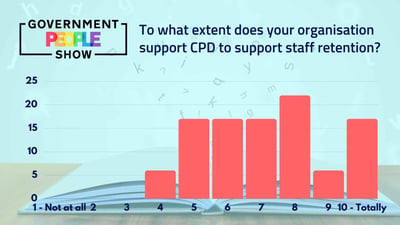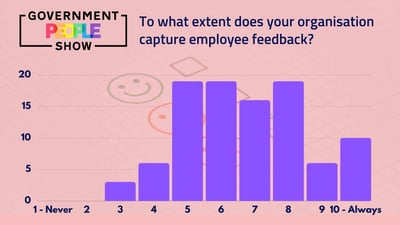The role of HR in embedding public sector transformation
HR is critical to providing the means of embedding positive change within the public sector - and also to shedding light on the reality of the employee lifecycle, with a view to making it more sustainable, according to senior execs at the Met Office, Ofwat and Qualtrics.
Speaking at the Government People Show, the panel discussion 'HR Transformation', supported by Qualtrics, explored how HR teams are acting as a catalyst to improve how the wider organisation attracts, develops and retains employees.
 For HR transformation to succeed, it must be embedded within the whole organisation, said Tammy Lillie, Chief People Officer at the Met Office: “People are the organisation and actually to embed it, and to live and breathe it, the people are paramount.”
For HR transformation to succeed, it must be embedded within the whole organisation, said Tammy Lillie, Chief People Officer at the Met Office: “People are the organisation and actually to embed it, and to live and breathe it, the people are paramount.”
Lillie added that HR has a huge responsibility to be a role model and to provide tools, processes and ways of working that can facilitate this transformation.
Jas Bilen, Director of People at the Water Services Regulation Authority (Ofwat), agreed that people service, or HR, has a vital role in embedding organisational operational transformation. However, he added that HR departments should build on that and be a challenger to the organisation.
 “We've got to look at our processes, using technology, making that whole employee lifecycle journey much better, and bringing that to surface, using some of our informal networks,” added Bilen. “[It’s] very much about telling the story, understanding the narrative, the vision and what we want to get to, and using those channels to bed in that change.”
“We've got to look at our processes, using technology, making that whole employee lifecycle journey much better, and bringing that to surface, using some of our informal networks,” added Bilen. “[It’s] very much about telling the story, understanding the narrative, the vision and what we want to get to, and using those channels to bed in that change.”
Organisations need to rethink the relationships with their employees and understand that people are looking for purpose: “Employees are looking to understand what the organisation's package is offering, what it means to them,” said Bilen.
Employee experience
Panellists agreed that there is still work to be done on how workplaces articulate their value proposition and improve the employee experience.
 Simon Daly, Employee Experience Strategist at Qualtrics, said that, post-pandemic, staff are increasingly demanding more flexibility and far better physical and digital work spaces. Wellbeing and the ability to disconnect are essential to workers - and employers need to be creative in how they trigger productivity on the back of this.
Simon Daly, Employee Experience Strategist at Qualtrics, said that, post-pandemic, staff are increasingly demanding more flexibility and far better physical and digital work spaces. Wellbeing and the ability to disconnect are essential to workers - and employers need to be creative in how they trigger productivity on the back of this.
Ensuring that continuous professional development (CPD) is accessible and promoted is important to ensure that employees remain engaged and as a way to support staff retention. A live poll carried out during the session showed that 17% of delegates think that their organisation supports CPD in every way possible for staff retention, while the majority could clearly see at least some efforts being made, even if more can be done.

At Ofwat, Bilen and his team are looking at ways to ensure that learning and CPD are embedded in the culture of the organisation and that people can take time off their busy schedules for it, whether in a classroom or through informal learning, to ensure they are up to date in their career pathways and where they want to go.
Creating a sense of community is also important for Lillie. During the last 18 months, the Met Office has reinforced the value of professional standing among staff.
“We currently already pay professional fees, and if you need to get to a level of professional registration, there is a one-off award,” Lillie explained. “[It’s] realising that people are not always staying in the same organisation all their lives. So the profession is really important, and how that travels with you.”
From feedback to action
Gathering employee feedback can help organisations transform their practices but as the speakers remarked, unless feedback is followed by outcomes, it becomes useless. “Listening to feedback is only 50% of the puzzle,” Daly said. “The question is - is there action happening off the back of it?”

“If you don't take action, I think it's probably worse than anything,” added Lillie. There are cases, however, where some matters are outside HR’s control and Lillie said that it's important to explain that to employees.
Bilen agreed that honesty is hugely important and that feedback should be made as simple as possible, in particular, explaining what can and cannot be changed. “I think sometimes we'll collect feedback and nothing happens with it, and that's really frustrating for our people,” Bilen added.
“If you're asking for feedback and there's something you can't do, I think acknowledging it and explaining and responding is really important. And that can then keep the cycle of feedback going and people are willing to engage with you and tell you how they're feeling.”




